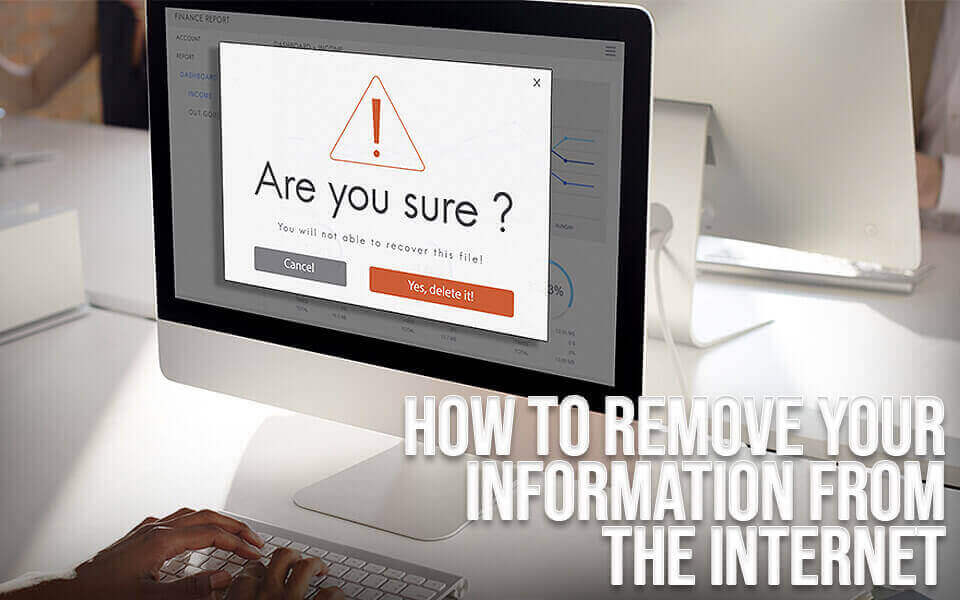How To Remove Your Information From The Internet?

Do you think your personal information is being compromised? Probably yes. Tricksters use various fraudulent tactics to remove your personal information from the internet and other social media sites. Further, they use your information to conduct other deceit.
What is a Cyberspace scam?
Cyberspace or Internet scams refer to fraudulent schemes conducted by scammers to deceive people into providing personal information, money, or access to their devices online. Tricksters conducting fraudulent schemes include phishing, investment fraud, and promising unrealistically high returns with minimal risk.
Along with it, there are also tech support scams. This fraud often involves phony technical support, whereas romance scams exploit emotions for financial gain. Online consumers may encounter counterfeit or nonexistent merchandise. To prevent falling victim to these deceptive practices, awareness and vigilance are essential.
Why is it important to manage your online presence?
Managing your online presence is essential since it influences how other people perceive you in the virtual world, which influences your personal and professional opportunities. People often use your online presence to form opinions about you.
Moreover, a positive online presence can build trust, help in networking, and enhance credibility. Simultaneously, on the other hand, a negative online presence may potentially lead to missed opportunities and damage your reputation.
Additionally, you can also control the story around you by engaging meaningfully, sorting out content, and protecting your sensitive information. Preemptively, managing your online presence ensures that it matches your definite goals, fosters stronger connections, and represents your finest abilities and personality.
Unveiling a few tactics used by tricksters to remove your information from the internet
Tricksters employ various unscrupulous tactics to mislead individuals and remove your personal information from the internet:
- Data scraping – This is the process of collecting data from websites and other online sources automatically. In other words, tricksters use this technique to collect your personal information, such as your name, address, phone number, and even email address.
- Social engineering – This is the practice of tricking people into giving up their sensitive information, which includes personal and financial details. Tricksters pose as legitimate individuals or entities in order to gain your trust.
- Phishing – This is one of the most common types of social engineering fraud that involves sending emails or text messages that appear to be from a legitimate source. The emails or text messages frequently include a link that, when clicked, takes the victim to a fraudulent website that appears to be the legitimate one. The trickster can steal the victim’s personal information once they enter it on the bogus website.
- Scareware – This is a type of malware that is designed to “scare” people into extracting their personal information. In other words, scareware comes in the form of pop-up ads that warn the victim that their computer is infected with a virus or other malware.
- Pretexting – This is also a type of social engineering that involves creating a false scenario in order to trick someone into giving out their sensitive information. For instance, a trickster posing as a government official would call you, claiming that they need your Social Security number to investigate a crime.
What are some common strategies for addressing negative or misleading information online?
Addressing negative or misleading information online can be complex and challenging, which requires a strategic approach to ensure that you’re effectively countering false narratives while maintaining a respectful and productive online presence. Mentioned below are some common strategies:
- Verify information – Before responding, make sure the information you’re countering is actually deceptive or misleading. It is imperative for you to research and gather evidence to support your claims to the legal authorities.
- Provide accurate information – You should use accurate and credible information to counter negative or misleading assertions. Moreover, it is imperative to use reliable sources to back up your claims. Overall, to back up your information, provide evidence, figures, and other references.
- Use clear and concise language – Gather all your data and communicate your points clearly and concisely. Also, avoid using jargon or overly technical language that could be confusing to common individuals.
- Use visuals – Visual content like images, videos, and infographics can effectively convey a generous amount of information and make it more subtle and engaging. Additionally, visual aids are eligible to help break down complex or challenging concepts and provide information in a rudimental way.
- Engage in constructive conversations – Engage in open and constructive conversations with individuals who share or consume bad information. However, in order to stimulate critical thinking, ask questions and express your counterattacks constructively.
How to remove your personal information from the internet?
Removing your personal information from the internet can be challenging, so once your information is online, it doesn’t take sufficient time and spreads quickly virtually. However, listed below are a few tips you can use to recover a considerable amount of personal information:
- Request data broker sites to remove data – Initially, the process begins with locating the websites that have potentially visited and have your information. You can then ask for it to be removed. However, hundreds upon hundreds of these sites are in play, which makes it difficult to know where to start, and it’s even tougher to make requests once you have discovered the sites that post and sell information about you.
- Remove personal details from other websites and blogs – If you’ve ever written blogs or created any content online, it might be a good idea to take it down if it is no longer serving a purpose. Depending on what you’ve posted, there is a possibility you have revealed personal information about yourself. Furthermore, you may be mentioned by others in several social media posts, articles, or blogs. Ultimately, it’s worthwhile to contact these individuals and suggest that they remove posts containing sensitive information.
- Eliminate old social media accounts – As mentioned earlier, data brokers can collect information from public social media profiles. Consequently, it’s important for you to minimise your presence on social media. For instance, make a list of the ones you use or have used in the past. If you have old accounts or websites that you no longer use or refer to, you may want to deactivate them or consider removing them totally to safeguard your personal information from further harm.
- Delete dormant phone apps and restrict their settings – Another way you can get rid of your digital footprint online involves eliminating all the unnecessary phone apps that you no longer use or need. Because even when apps are not in use or open, they may be able to track confidential information such as your real-time location and even your financial details if you have paid a subscription program for the app. Additionally, you can get rid of the phone apps by restricting their settings for functionality.
FAQs
Why is it crucial to abstract personal information from the internet?
Initially, personal information can enable identity thefts performed by tricksters and other cybercriminals to access your financial accounts. Cybercriminals can use your personal information and use it further in deceptive techniques, which include doxxing, extortion, and other online tricks.
Can I clear my email from the dark web?
Typically, it’s not possible to erase your email from the dark web. This is due to the chaotic and unregulated nature of the dark web. You should deactivate the email account and use email masking and proper digital hygiene to protect your new email address.
Engaged in real trouble and getting your privacy identity compromised? Connect with us, and we will help you identify unsecure websites.


 4.7/5.0
4.7/5.0
 3.6/5.0
3.6/5.0